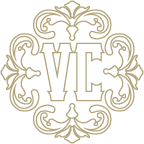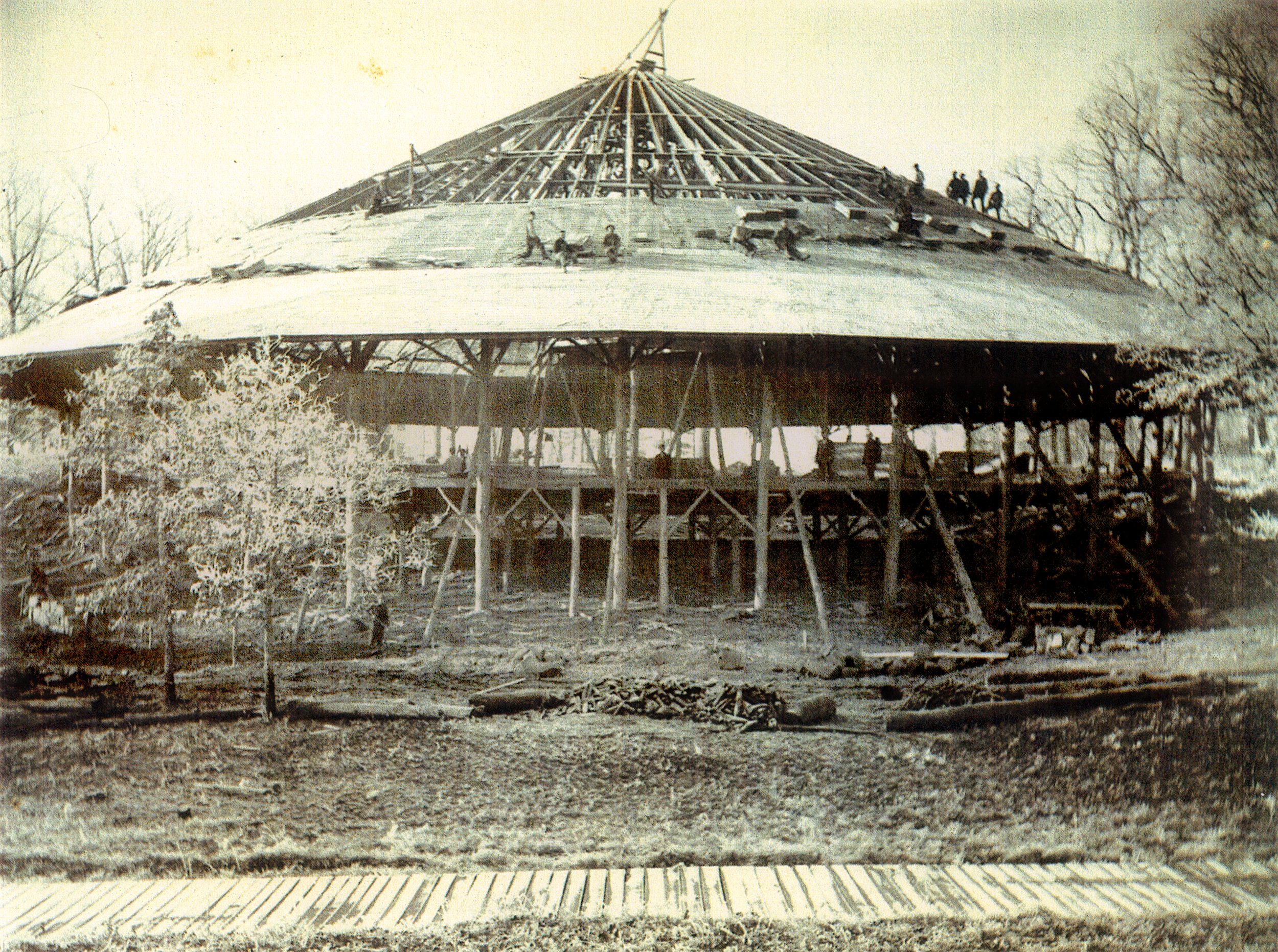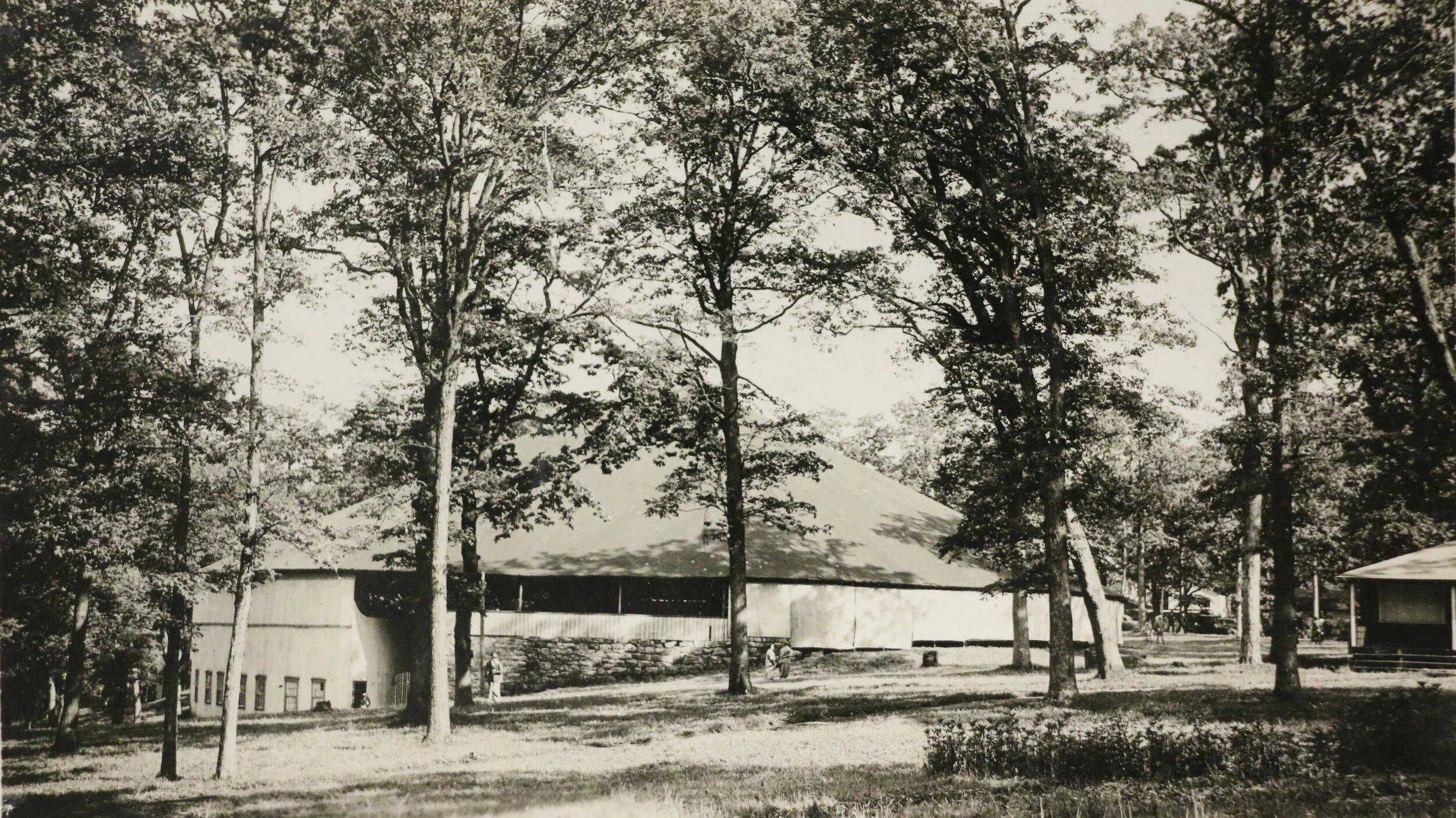Mountain Chautauqua Stories
Watch all five episodes of Mountain Chautauqua Stories.
Mountain Chautauqua Stories shares the long history of Mountain Lake Park with five 40-minute episodes.
The Founders | The Faithful | The Robinsons | The Culture | The Legacy
Select the “down” arrow in the top-left corner to choose the episode you want to watch.
Shaw-tock-wah?
That’s how you say it. Many people may have heard the word Chautauqua but don't necessarily know what it means. Simply put, it’s an educational institution for experiential learning of literary works, music, historical and topical people and events, arts, and culture.
You can also visit the Mountain Lake Park Historical Association (MLPHA) website and subscribe to updates of special events and activities. Membership is free.
Camp meeting picture taken in front of the Assembly Hall which still stands today. Thousands arrived by train every summer.
The term Chautauqua originated in Chautauqua, New York, where a Methodist resort founded in 1874, provided immersive faith-based learning and cultural exposure.
The Methodist leaders at the time felt very strongly that education should be an integral part of their faith intended to elevate individuals, including women and children. Their goals were progressive for the time considering many women were non-educated, nor did they share the same rights as their male counterparts.
Victorian vacationers and part-time residents would attend lectures and classes in the New York community throughout the summer months as a getaway from urban heat and congestion. Because of the remote natural setting, outdoor recreation was also incorporated for a healthful, relaxing escape from routine life.
KEEP GOING
Mountain Lake Hotel staff
The popular Mountain Lake Hotel fell into disrepair in the 1970s and was eventually torn down.
The Mountain Lake Park B&O Railroad Station still stands. The original turret was modified and the overhangs were enclosed in a restoration.
The original New York resort was named after Lake Chautauqua, a featured attraction, which is speculated to come from the now-extinct Native-American Erie Language.
The Chautauqua model grew quickly in popularity with other rural communities that began popping up to mirror and capitalize on the institution's success. One of the early Chautauquas in the United States was founded as Mountain Lake Park, along the Baltimore & Ohio Railroad in 1881. A small group of ministers and businessmen began the association with nothing more than a dream. Not even a lake was on the 800 acres they purchased for the proposed resort. That was quickly resolved by constructing a dam to create the lake for recreation through the summer months and for ice harvests in the cold season. The Alleghany Mountain location gained much praise and attracted notable guest lecturers including, Mark Twain, William Jennings Bryan, and President Taft.
KEEP GOING
The Mountain Chautauqua grew rapidly and in the early 1890s plans were already underway to build a larger auditorium to accommodate 5,000 spectators. The Bashford Amphitheater began construction in 1889 and was dedicated in 1900. The stage was large enough to hold up to 450 performers.
In its heyday, Mountain Lake Park boasted 254 structures including the famed Bashford Amphitheater that seated 5,000 people.
The round open-air theater included a similarly designed Ticket Office that remains to this day and serves as a museum to showcase the past. Within the registered Historic District, significant buildings still standing are The Assembly Hall, The Thompson Rest Home for Deaconesses, Town Hall, clay Tennis Courts, the original Methodist Church, and over 50 summer cottages dating back to 1880.
The Bashford Amphitheater was razed in the 1940s due to lack of funding to repair the roof.
Maryland’s Chautauqua History
Mountain Chautauqua
In 1881 a group of Methodist ministers and businessmen decided to create the Mountain Chautauqua in Maryland, modeled after the 1875 Chautauqua in New York state. The group purchased 800 acres of farmland in Garrett County, founded an association called Mountain Lake Park, and organized the first Mountain Chautauqua in the summer of 1882. The program presented a wide range of educational, spiritual, social, and recreational activities throughout the summer months.
Modern Maryland Chautauqua
To resurrect the Chautauqua spirit in Maryland and increase public interest in culture and history, Maryland Humanities established the modern Maryland Chautauqua in 1995. Each year, three evening performances of a common theme tour eight locations in the state with professional re-enactors portraying the lives of historical figures. Their season kicks off at Garrett College on the nights of July 5, 6, and 7 and is locally organized by Garrett Lakes Arts Festival (GLAF).
Mountain Chautauqua, Then and Now
To celebrate the 25th anniversary of the modern Maryland Chautauqua, GLAF expanded the three evening performances into three full days and evenings. In 2019, July 5-6-7 fell on a Friday, Saturday, and Sunday, so the three-day festival, titled "Chautauqua Then and Now", took place over a weekend in Mountain Lake Park to recall the original Mountain Chautauqua years. In 2020, the modern Maryland Chautauqua program from Maryland Humanities returned as a virtual event to accommodate the pandemic. It was later announced that after 26 years, it would be their final season of Chautauqua programming.
Victorian Chautauqua
The residents of Mountain Lake Park and many of the volunteers who staged the 2019 Chautauqua Then and Now were so enthralled with the Chautauqua’s return that they decided to make the weekend daytime festival an annual event. The new name "Victorian Chautauqua" will be held each weekend following the 4th of July, preceded by a Friday evening gala fundraiser. The two-day Victorian Chautauqua will feature live music, historical lectures, re-enactors, children's activities, artists and heritage demonstrations, and historic trolley tours, all in the spirit of the town’s founding members.








